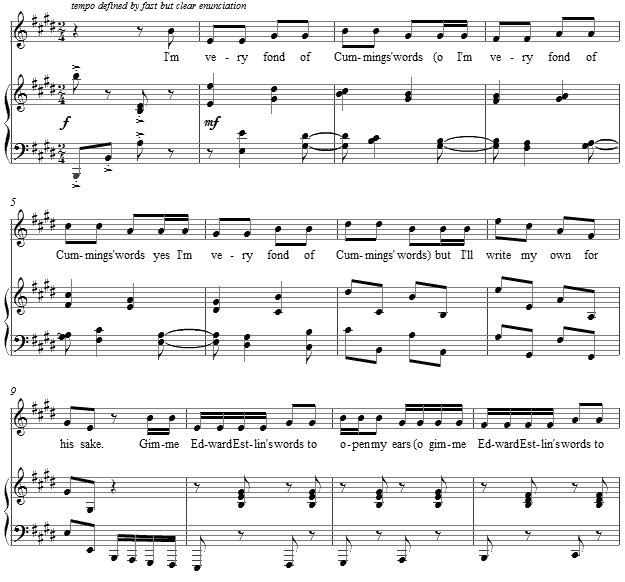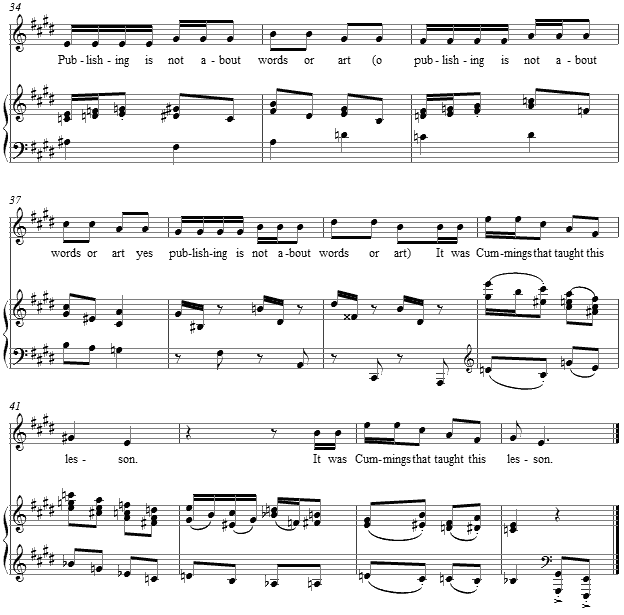Music and Texts of GARY BACHLUND
Vocal Music | Piano | Organ | Chamber Music | Orchestral | Articles and Commentary | Poems and Stories | Miscellany | FAQs
I'm very fond of Cummings' words - (1989/2008)
text by Gary Bachlund after a poem by E. E. Cummings
for medium voice and piano
I'm very fond of Cummings' words
(o I'm very fond of Cummings' words
yes I'm very fond of Cummings' words)
but I'll write my own for his sake.
Gimme Edward Estlin's words to open my ears
(o gimme Edward Estlin's words to my ears
yes gimme Edward Estlin's words to my ears)
though I won't use some as lyrics.
Nothing like a copyright ruining the blues
(o nothing like a copyright ruining the blues
yes nothing like a copyright ruining the blues)
but a dictionary's got more.
Norton wanted cash up front for Cummings' nifty words
(o Norton wanted cash up front for Cummings' nifty words
yes Norton wanted cash up front for Cummings' nifty words)
and I reckoned that's not worth paying.
Publishing is not about words or art
(o publishing is not about words or art
yes publishing is not about words or art)
it was Cummings that taught this lesson.[ 3 pages, circa 1' 00" ]
Edward Estlin Cummings
Cummings' text comes from "LATE POEMS, 1930-62" [ 1 ] and in that anthology is titled, "i'm very fond of." Utterly charming, it begins in hymn-like fashion with the mention of a soup, then moves to women, then to theology and thence to his all-important observation that "Everybody's dying to be someone else." This was a consistent argument for any artist, as Cummings encouraged "the moment you feel, you're nobody-but-yourself." After all, he himself testified that "To be nobody-but-yourself -- in a world which is doing its best, night and day, to make you everybody else - means to fight the hardest battle which any human being can fight; and never stop fighting." [ 2 ]
In this admiring parody of Cummings, I choose to state the obvious -- that creativity and the business of publishing are quite different human pursuits. In asking for the right to publish Cumming's texts in my settings, W. W. Norton, the owner of the Liveright subsidiary, had its business position -- cash up front and control over how many of my own examples I might cite on my own web site, which was a "deal breaker" [ 3 ] -- and I had only my deep and abiding interest in the poetic art and insight of the poet himself. I would happily have agreed to a standard set of terms, which were not forthcoming. Hence this verse as parody, using the form of Cummings' original but in no way violating its copyright. I thank Cummings for teaching me this fine lesson, that an estate might control assets but rarely controls the message of the artist, which in Cummings' life and example was one of artistic freedom and often rejection and criticism at the hands of publishers and establishment academia alike. He choose to "never stop fighting," and this is his advice to us as artists which has not a darn thing to do with estate issues, fiduciary responsibilities to copyright owners and general asset management. "Never stop fighting."
The five strophes of this patter song -- for the tempo is to be dictated by the performer's fast but clearest possible pronunciation -- are each treated differently, beginning with the off-beat canonic gambit.
The last strophe is accompanied by a succession of non-functional dominant seven chords, as can be seen beginning at measure 34's odd spelling of C7 in inversion, such that by measure 40's succession of dominant seven chord inversions - E7 - C#7 - A7 - F#7, the accompaniment following dutifully the vocal line. With the discordant rupture at measure 41, the succession continues its own way as the vocal line comes to cadence in the tonic major. Only at the last gesture in the piano does the accompaniment then bend to the tonic of E major after a last gasp at C7.
The score for I'm very fond of Cummings' words is available as a free PDF download, though any major commercial performance or recording of the work is prohibited without prior arrangement with the composer. Click on the graphic below for this piano-vocal score.
I'm very fond of Cummings' words
NOTES
[ 1 ] Found in ETCETERA, the Unpublished poems of E. E. Cummings, 1983, Liveright, New York and London. p. 132.
[ 2 ] As cited in my article, On Art Songs.
[ 3 ] See my No Thanks, "a source list and some thoughts on setting and not marketing a song anthology of the poetry of E. E. Cummings."


